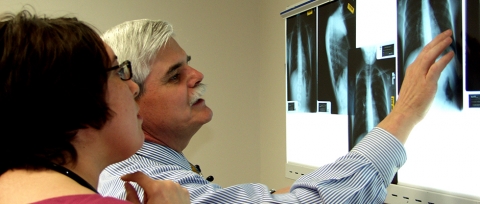Pediatric Pulmonary Medicine Fellowship

NEXT FELLOWSHIP POSITION AVAILABLE: JULY, 2025
The primary mission of our 3-year fellowship training program is to prepare physicians for careers in pediatric pulmonary medicine. Following the guidelines established by the ACGME and the American Board of Pediatrics, our fellows gain experience in all aspects of pediatric pulmonary medicine with dual emphases on clinical and scholarly excellence.
Our overriding goal, built over the past 40 years at thona College of Medicine and the University of Arizona Asthma and Airway Disease Research Center, is to train the next generation of clinician-scholars to carry forward pioneering work and leadership in pediatric pulmonary medicine. We provide extensive training in clinical pulmonology, clinical and basic research techniques, and teaching methodologies. Our overall goal is to train academic pediatric pulmonologists who will deliver state-of-the-art care to children with respiratory disorders, become independent investigators, and contribute to our understanding of the pathophysiology and treatment of pediatric respiratory disease. Most importantly, we want to help guide trainees to find and then achieve the goals they want for their careers.
Clinical Training:
The fellow will receive intensive subspecialty training during the course of the three-year fellowship. Training will expose the fellow to a wide variety of acute and chronic pediatric pulmonary problems, detailed understanding of pulmonary physiology and pulmonary function testing techniques. The fellow will be trained in flexible bronchoscopy, obtaining ciliary biopsies, and performing alveolar lavages. By completion of the fellowship the fellow will have completed 100 Bronchoscopies. The fellowship also focuses on multidisciplinary treatment of Cystic Fibrosis and treatment for patients with Aero-digestive Disorders. Vent and Trach management of chronic and acute patients will be covered in inpatient and outpatient settings. For completion of the fellowship the trainee must demonstrate mastery of all ACGME competencies and must demonstrate sufficient competence to enter practice without direct supervision.
Research Training:
Research is an integral part of the Pediatric Pulmonary Fellowship curriculum. The Pediatric Pulmonary division is a part of the University of Arizona Asthma and Airway Disease Research Center. The A2DRC is an internationally renowned, comprehensive Center of Excellence that combines the highest caliber of research, clinical care, and teaching. The fellow will be guided and evaluated by a research mentor and a scholarly oversight committee throughout the duration of the fellowship. The fellow will be able to choose a research project which may be implementation, translational, clinical, or basic science.
Formal Education:
Educational activities: Didactic/Interactive learning activities are framed by the ACGME Pediatric Pulmonary Program Requirements, Core Competencies and foregrounded by topic recommendations from the American Sub Board of Pediatric Pulmonology. The fellow will be given regular opportunities to hone teaching skills, either during division meetings, or to the Medical students during Clerkship lectures. The fellows will also be giving talks for the Maternal and Child Health Bureau funded Pediatric Pulmonary Center. The fellows will take annual in training examinations (SITE) and will receive training in preparation for their sub board certification. In the past ten years, our program as a 100% pass rate.
Facilities/Personnel:
Our Pulmonary Division has 2 administrative staff and adequate office facilities including desktop computers for trainees. Trainees have full access to digital textbooks and the literature through the Arizona Health Sciences Library. Our pulmonary function lab is based at our outpatient clinic and is staffed by two technicians and is capable of measuring lung function from early childhood through late adolescence. Outpatients are seen in our dedicated pulmonary clinic with dedicated reception and nursing staff. Several clinics are supported by a superb interdisciplinary team including nursing, respiratory therapy, social work, psychology, nutrition, and pharmacy.

